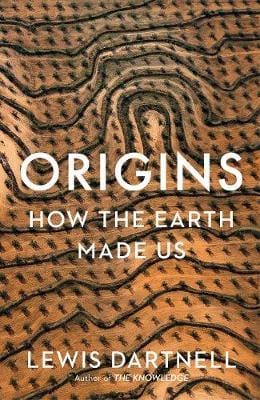Origins: How the Earth Made Us by Lewis Dartnell
Book of the Week: 3 March 2019

Cover photograph Yann Arthus-Bertrand/Getty Images
So many of you have enjoyed Sapiens by Noah Yuval Harari that when Origins was compared to it by reviewers, I bought it immediately. I have managed to find a geography graduate who has read it and here are his comments:
The Pale Blue Dot is a photograph of Earth taken by Voyager 1 in 1990 when it was 6 billion kilometres from Earth. Carl Sagan wrote ‘Look again at that dot. That’s here. That’s home. That’s us. On it everyone you love, everyone you know, everyone you ever heard of, every human being who ever was, lived out their lives.’ But how did it get that way? Why did we humans develop that way and, in just 10,000 years, go from the Stone Age to having wheeled-rovers exploring Mars?
When we look back at our history we tend to think of leaders, great wars, political tensions, disputes over territories or borders but fail to realise that the Earth itself has determined our destiny. The continuing movement of the Earth’s tectonic plates has changed the very shape of our planet from one single continental mass to the globe we recognise now. Mountain ranges have been thrust up, causing fundamental changes in weather patterns and sea currents; ice ages have been a regular feature throughout millennia with massive changes in sea-levels occurring as water gets locked up in ice and then released in a thaw. Civilisations were able to grow and develop because they were fortunate enough to have suitable weather, animals capable of domestication and types of grass that were selectively bred for cereal crops, as a result of millions of years of geographic meandering of land masses and volcanic underground turmoil.
Origins outlines the many factors that had to happen, in sequence, to make our Earth as it is and for humans to become the most developed creature that has so far lived. The probability of life is astonishingly small and this book shows the path from a world with no oxygen and one giant land mass, to the place we recognise. The ‘entire history of civilisation is just a flash in the current interglacial period.’ In 50000 years the next ice age is predicted to begin. Earth made us.
If you enjoy this, you might like Lewis Dartnell’s The Knowledge, or, if you like books that cover ‘big topics’, you may like The Silk Roads by Peter Frankopan or Noah Yuval Harari’s books. These are all in stock in the Tim Pigott-Smith Library.





